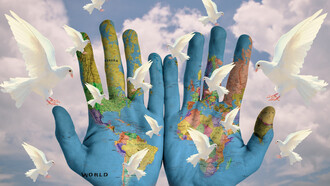The war in Ukraine is having particularly negative effects on women's and girls’ health and well-being. They encompass not only gender-based violence but include all aspects of women’s and girls’ lives. Access to basic services and life-saving sexual and reproductive health care has been drastically disrupted.
Since the 2013 Maidan revolution, also known as the “dignity revolution,” Ukrainian women have been increasingly engaged in the political, social, and economic affairs of the country. This engagement has led to an increase in women’s political participation, manifested by gains in parliamentary seats and in the village and regional councils. As a result, Ukraine has ratified or joined most international agreements on gender equality.
In spite of these advances, however, gender inequalities persist, bolstered by traditional norms that promote systemic discrimination and biases against women and girls. These inequities have been aggravated by the war conducted by Russia in eastern Ukraine since 2014. The years of conflict since then have increased and deepened pre-existing gender inequalities and created new ones such as arbitrary killings, rape and trafficking.
The war has particularly affected marginalized and disadvantaged groups such as female-headed households, internally displaced persons, Roma people, people with disabilities, and LGBTQ people. As a result, women facing multiple forms of discrimination are in need of special assistance.
Today, millions of people have fled Ukraine and millions more, nearly two-thirds of them women and children, have been internally displaced and, as a consequence, do not have access to essential services such as health care, employment, and housing. Poverty and dependency on social assistance have increased and have pushed many women into the unprotected informal sectors of the economy.
The COVID-19 pandemic, which began in Ukraine on March 3, 2020, threatened to eliminate the gains that had been made in women’s rights, economic empowerment and access to health care. Prolonged restrictions on mobility, particularly for women and young people, have increased despair and isolation, and have increased their negative effect on people with mental health challenges. Ukrainian young people and children are forced to sacrifice their future so they can survive in the present.
Even in times of peace, women tend to be more food insecure than men, but the war in Ukraine has exacerbated the number of women experiencing hunger, energy insecurity and economic instability. The Russian aggression on Ukraine has provoked a redistribution of family roles, adding to the already heavy burden of women who, in addition to traditional home responsibilities are now obliged to look for additional sources of income.
Women who are caring for children face extreme shortages of essential medicines, healthcare and funds to obtain basic items, including baby food and formula. Many women face the challenge to accommodate and feed internally displaced people. This increases their unpaid care and domestic work responsibilities, often at the expense of their physical and mental health and well-being.
The martial order issued by the Ukraine State Border Guard Service at the beginning of the Russian invasion that led to tens of thousands of civilians fleeing to other countries decreed that those between 18 and 40 years old should stay in the country. It is estimated that 95 percent of single-parent households are headed by single mothers, who now face increased pressure to provide for their families while male family members are more directly involved in defense activities.
Despite the heavy burdens imposed by the war, Ukrainian women have shown considerable resilience and have contributed greatly to defense efforts. It is estimated that women make up 25 percent of the Ukrainian armed forces. This is an almost 10 percent increase from the beginning of the Russian invasion. Women have integrated fully into the armed forces, performing duties as soldiers and holding positions of command.
In March 2022, when the city of Ivano-Frankivsk began offering firearm lessons to civilians, thousands of women signed up, angered at reports of war crimes and sexual violence carried out by Russian soldiers against Ukrainian women and girls. Many of those sexual assaults were committed by Russian soldiers in front of the women’s children.
Regrettably, women's voices are not always heard in this barbaric war. Shelley Zalis quotes Maria Dmytrieva, Director of Programs at the Democracy Development Center, in Forbes, “When men write history, they don’t write about women because they don’t have the same experiences as women. They don’t go through pregnancies in war zones. They don’t deliver babies in bomb shelters. They don’t wander the city looking for the formula to feed their babies. So, it doesn’t make it into the history books.”
The Russian military leaders didn’t expect such strong resistance from the Ukrainian soldiers, and even less from a Ukrainian army strengthened by the participation of women, something that needs to be acknowledged and honored as a critical factor in the defense of their country. As Sima Bahous, UN Women Executive Director, said: “Systemic, gendered crises require systemic, gendered solutions. That means ensuring that women and girls, including those from marginalized groups, are part of all the decision-making processes. That is simply the only way to be certain that their rights and needs are fully taken into account as we respond to the clear facts before us.”















